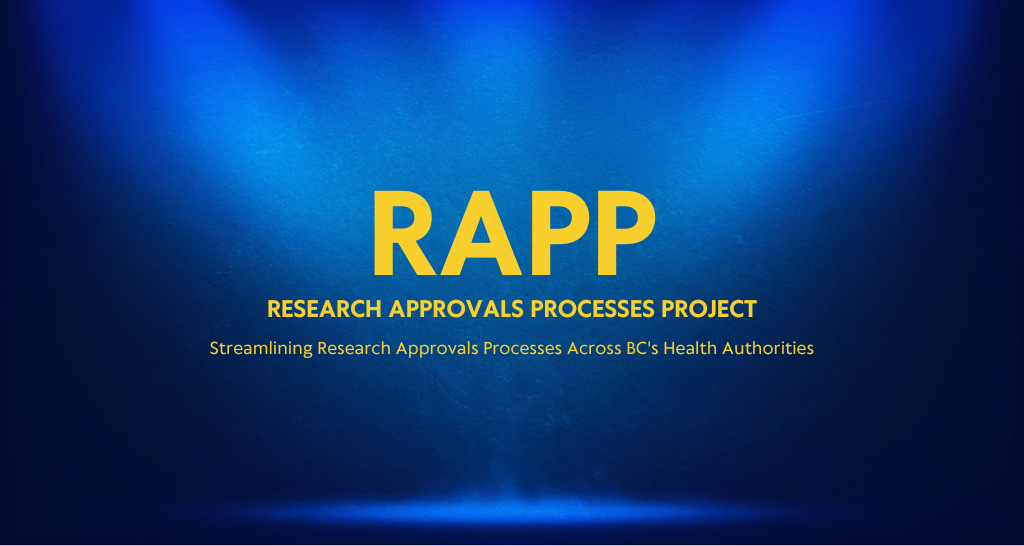Symposium sparks new ideas to enhance clinical trial accessibility in British Columbia
8 February 2024

Accessibility to clinical trials catalyzes change for a stronger health research system. They generate robust evidence for lifesaving interventions such as vaccines, drugs and devices. British Columbia’s vision for clinical trials was the force that recently brought the clinical trials community together.
“There are 13 collective priorities for our community to advance. One of those is to advance person-centred approaches and designs to create a clinical trial experience that is culturally safe, trauma-informed, inclusive, accessible, and available to all who want to participate,” said Alison Orth, director, Clinical Trials BC at Michael Smith Health Research BC. “Every action matters. Together, we can make the changes we need.”
That shared priority was the theme of the Approaches for Accessible Clinical Trials symposium hosted by Clinical Trials BC to advance the provincial vision. Participants virtually and in-person from across the province and beyond explored novel pathways, technologies and approaches to make clinical trials more accessible for British Columbians.
Jean Smart, regulatory affairs and quality officer, Clinical Trials BC opened the event and introduced Tsatsu Stalqayu (Coastal Wolf Pack), who performed a traditional welcome that left participants enthusiastic for a day of learning and insights.
|
Watch the recording Experience and share the beautiful performance. |
Alison laid the foundation for the symposium and highlighted the need to remove barriers to participation and build a more robust clinical trials ecosystem aimed at improving health and healthcare across the province.
|
Watch the recording Hear more from Alison about what the |
Approaching accessibility
“Research is care,” said Lisa Elser, a patient partner on the Clinical Trials BC advisory council. “Populations who are unable to access the clinical trials they need are simply not getting the best care we can offer.”
In one forum, speakers shared their insights about establishing stronger connections between research and care and emphasized the need to build trust with research participants from special populations. They focused on how to make research meaningful for participants and shared practical ways to design clinical trials to ensure improved accessibility and inclusion.
|
Watch the recording Learn how to build trust for better clinical trials. |
Eighty-five percent of clinical trials don’t have enough patients. In a forum about removing barriers, speakers discussed approaches to making clinical trials more inclusive for underrepresented groups.
One solution to this challenge is REACH BC — Health Research BC’s online platform that makes it easier for British Columbians to find out what health research is happening in BC, connect with researchers and participate. The discussion highlighted how REACH BC empowers research volunteers and builds community.
Symposium attendees also heard an inspiring talk from patient advocate Jim Mann. Jim shared his journey about conducting research despite living with Alzheimer’s disease. He spoke about the meaningful engagement of people with dementia, issues with ethics and consent, and stigma and unconscious bias. Jim encouraged researchers to include participants as part of their research team to co-design the study but emphasized only if they are actively engaged and directly focused on the research process.
“Their perspective will be different than yours. Their eagerness to ensure success will be refreshing. And their insight may well be the ‘a-ha!’ moment your project didn’t know it needed,” said Jim.
|
Watch the recording Reflect on how we can transform the |
Ensuring Indigenous cultural safety in clinical trials
Part of BC’s vision is ensuring the clinical trial experience is culturally safe. Brittany Bingham, director of Indigenous research, Indigenous health at Vancouver Coastal Health, presented her work on Indigenous representation in clinical trials and decolonizing research. In conversation with Gillian Corless, senior manager, Indigenous partnerships at Health Research BC, Brittany called for more Indigenous-led research practices and discussed the ways research can address inequities and accountability throughout our clinical trials ecosystem.

Bringing clinical trials closer to home
The traditional, centralized delivery of clinical trials can make it difficult for people in remote areas to participate in research studies. The second half of the symposium drew attention to the need for decentralizing clinical trials. Bernie Eigl, staff medical oncologist, BC Cancer and clinical associate professor, UBC, explained the rationale, processes and outcomes of the Canadian Remote Access Framework for Clinical Trials (CRAFT) pilot project at BC Cancer. CRAFT is driving a decentralized approach to enhancing quality of care that ensures research experience, regulatory requirements and safety at satellite sites. He also shared the path forward to implementing this model across Canada.
|
Watch the recording Hear the insights about CRAFT. |
In her keynote address, Jane Myles, program director, Decentralized Trials and Research Alliance, emphasized that decentralized clinical trials (DCT) were about giving patients the choice to participate. A DCT uses technology, processes and services to create opportunities that reduce the need for participants to physically visit a traditional research site. Some or all of the trial’s activities happen at alternate locations, such as the participant’s home, local health facility or nearby pharmacy.
Jane discussed five barriers to adopting DCTs but noted that current adoption trends were moving upwards. She asked researchers to consider what patients think and whether they have typically measured patient experience in trials.
“We [don’t] ask most patients ‘was this a good thing, did you enjoy it, did it save you time?’ In a decentralized setting, if you’re using a standard platform, you now have the opportunity to collect patient experience data outside of the clinical dataset. Think about how you might do that,” said Jane.
She presented survey findings on patient perceptions and insights about clinical trials and highlighted a key takeaway: “Patients are willing to go where they believe they will receive adequate care. It does not have to be a traditional research centre. This [is a] signal to us that patients are ready, and we have to adapt our methods.”
|
Watch the recording Hear more from Jane as she talks about minimizing participation burdens, increasing access and choice and improving patient experience and engagement. |
Change: From talk to action
The symposium wrapped up with an about how we as a province could move ideas into action collaboratively. Panelists and participants exchanged meaningful dialogue on knowledge translation, patient consent, data sharing and insights from a range of experiences.
|
Watch the recording Listen to the engaging discussion about moving from talk to action. |
The path forward
As we reflect on the discussions and insights from the Approaches for Accessible Clinical Trials symposium, we are inspired for the journey ahead. There were many themes that emerged over the day: research is high-quality care; diversity and inclusivity by design; uplift cultural safety; decrease system barriers; innovative capacity building; enable knowledge mobilization and dissemination; and learn from and activate emerging new models.
We are working with our partners and communities to build a robust, innovative and person-centred clinical trials ecosystem that benefits British Columbians and more. The information and knowledge we gained from this event will inform our work. Thank you to the 450 participants, speakers, moderators, partners and community members who contributed to the successful and meaningful event.
“What an amazing day, filled with excellent presentations and helpful, pertinent discussions. Good audience engagement as well. Love the very operations-focused and patient-centred theme this year.” – Participant
Learn more about Clinical Trials BC and watch for future events.





